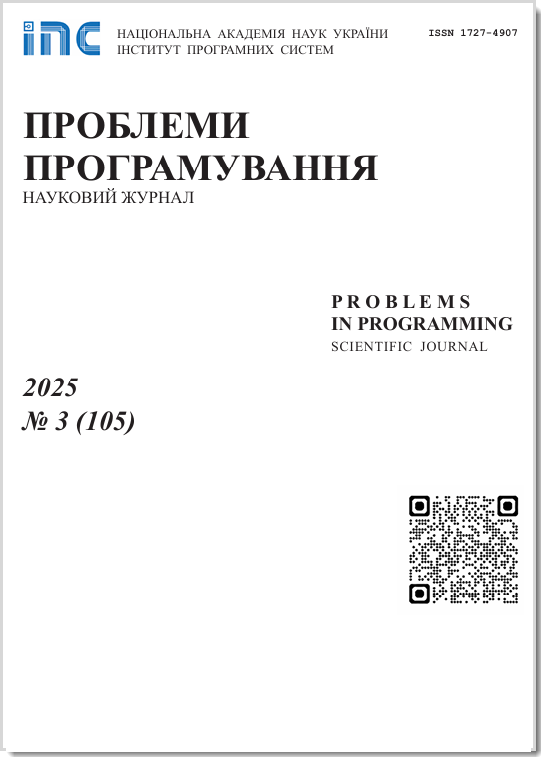Methods and techniques for management of ontolodgy-based knowledge representation models in the context of BIG data
Abstract
Ontology-based knowledge representation models in the context of big data are one way to reduce complexity for data processing across methods of semantic description. This research paper aims at providing an overview of the methods and techniques for efficient management of the ontology-based models that improve big data systems. For this case, the shapes constraint language (SHACL) for information validation was reviewed as the key method. The knowledge representation systems and reasoners are studied and reviewed in the paper as well. It describes approaches based on ontologies in the context of big data. The proper management of ontology-based knowledge representation models through offered methods and techniques brings improved data integration, big data quality, and business process integration.
Prombles in programming 2021; 4: 19-25
Keywords
Full Text:
PDFReferences
B. Mouad, «An Evaluation and Comparative study of massive RDF Data management approaches based on Big Data Technologies» International Journal of Emerging Trends in Engineering Research, т. 7, pp. 48-53, 2019. https://doi.org/10.30534/ijeter/2019/03772019
Y. Sure-Vetter, S. Staab та R. Studer, «Methodology for Development and Employment of Ontology Based Knowledge Management Applications» ACM SIGMOD Record 3, т. 4, № 31, pp. 18-23, 2002.
https://doi.org/10.1145/637411.637414
P. Haase та L. Stojanovic, «Consistent Evolution of OWL Ontologies» The Semantic Web: Research and Applications, pp. 182-197, 2005.
https://doi.org/10.1007/11431053_13
T. Dmitry , «Incremental and Persistent Reasoning in FaCT++» в ORE, 2014.
T. Dmitry та H. Ian , «FaCT++ description logic reasoner: System description» в International joint conference on automated reasoning, Berlin, 2006.
R. Shearer, B. Motik та I. Horrocks, «HermiT: A Highly-Efficient OWL Reasoner,» Owled, т. 432, p. 91, 2008.
Data and knowlege group. University of Oxford., «HermiT OWL Reasoner,» [online]. Available: http://www.hermit-reasoner.com/. [Date: 05 2021].
D. Michel , G. Birte , G. Rafael , H. Matthew, J.-R. Ermesto, N. Matentzoglu та P. Bijan, «ORE Live Competition» 05 2021. [online]. Available: http://dl.kr.org/ore2015/vip.cs.man. ac.uk_8008/reasoners.html.
V. Haarslev, «The RacerPro knowledge representation and reasoning system» Semantic Web, т. 3, № 3, pp. 267-277, 2012.
https://doi.org/10.3233/SW-2011-0032
M. J. Lawley та C. Bousquet, «Fast clas- sification in Protégé: Snorocket as an OWL 2 EL reasoner» в 6th Australasian Ontology Workshop (IAOA'10). Conferences in Research and Practice in Information Tech- nology, 2010.
G. Jose Emilio Labra, «Validating and Describing Linked Data Portals using RDF Shape Expressions.» в LDQ@ SEMANTICS, 2014.
J. Corman, J. L. Reutter та O. Savković, «Semantics and validation of recursive SHACL» в International Semantic Web Conference, Cham, 2018.
https://doi.org/10.1007/978-3-030-00671-6_19
W3C, «Shapes Constraint Language (SHA-CL)» 20 July 2017. [online]. Available: https:// www.w3.org/TR/shacl/. [Date: 05 2021].
M. Terdjimi, M. Lionel та M. Mrissa, «Hylar: Hybrid location-agnostic reasoning» в ESWC Developers Workshop 2015, 2015.
https://doi.org/10.1145/2872518.2890542
A. Ameen, K. Ur Rahman Khan та R. B. Padmaja, «Reasoning in semantic web using Jena» Computer Engineering and Intelligent Systems, т. 5, № 4, pp. 39-47, 2014.
Apache Software Foundation, «Jena architecture overview» [online]. Available: https:// jena.apache.org/about_jena/architecture.html. [Date: 05 2021].
Oxford Semantic Technologies, «RDFox» [online]. Available: https://www.oxfordsemantic.tech/product. [Date: 05 2021].
DOI: https://doi.org/10.15407/pp2021.04.019
Refbacks
- There are currently no refbacks.









